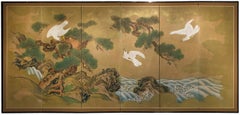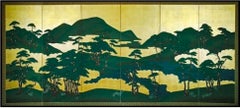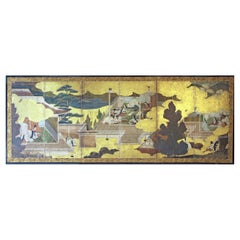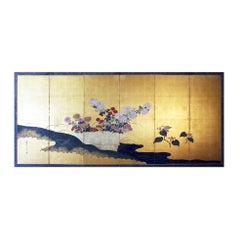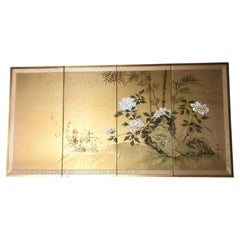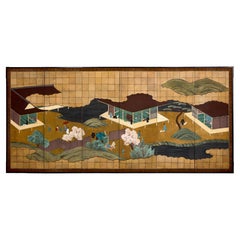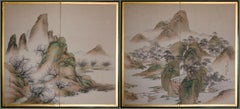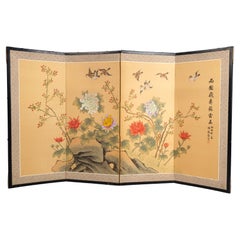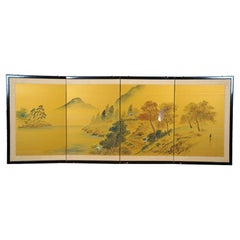Japanese Byobu
19th Century Other Art Style Landscape Paintings
Paper, Pigment
19th Century Tribal Landscape Paintings
Paint
Antique Early 18th Century Japanese Edo Antiquities
Gold Leaf
Antique Early 19th Century Japanese Edo Paintings and Screens
Gold Leaf
Early 20th Century Chinese Chinese Export Paintings and Screens
Metal, Metallic Thread
Antique 19th Century Japanese Japonisme Paintings and Screens
Paper
Early 20th Century Land Landscape Paintings
Pigment
Mid-20th Century Japanese Showa Paintings and Screens
Silk, Paper
Mid-20th Century Japanese Meiji Screens and Room Dividers
Canvas, Hardwood
Antique 19th Century Japanese Meiji Paintings and Screens
Gold Leaf
20th Century Japanese Showa Paintings and Screens
Gold Leaf
20th Century Japanese Showa Paintings and Screens
Gold Leaf
20th Century Japanese Showa Paintings and Screens
Gold Leaf
Mid-20th Century Japanese Showa Paintings and Screens
Wood, Paint, Paper
20th Century Japanese Showa Paintings and Screens
Wood, Paint, Paper
20th Century Japanese Showa Paintings and Screens
Silk
Antique 19th Century Japanese Edo Paintings and Screens
Gold Leaf
Antique Early 19th Century Japanese Edo Paintings and Screens
Gold Leaf
20th Century Japanese Showa Paintings and Screens
Gold Leaf
20th Century Paintings and Screens
Gold Leaf
Mid-20th Century Japanese Showa Paintings and Screens
Gold Leaf
Mid-20th Century Japanese Showa Paintings and Screens
Gold Leaf
Mid-20th Century Japanese Showa Paintings and Screens
Paper
Antique Late 19th Century Japanese Meiji Paintings and Screens
Gold Leaf
Antique Late 18th Century Japanese Edo Paintings and Screens
Gold Leaf
Antique Late 19th Century Japanese Meiji Paintings and Screens
Gold Leaf
Antique Late 19th Century Japanese Meiji Paintings and Screens
Gold Leaf
Antique Late 19th Century Japanese Meiji Paintings and Screens
Gold Leaf
Antique Late 19th Century Japanese Meiji Paintings and Screens
Gold Leaf
Antique Late 19th Century Japanese Meiji Paintings and Screens
Gold Leaf
Antique Late 19th Century Japanese Meiji Paintings and Screens
Gold Leaf
Early 20th Century Chinoiserie Paintings and Screens
Brass
20th Century Japanese Paintings and Screens
Paper
Antique Late 19th Century Japanese Paintings and Screens
Paper
Antique 18th Century Japanese Edo Paintings and Screens
Gold Leaf
Early 20th Century Japanese Screens and Room Dividers
Gold Leaf
Mid-20th Century Anglo-Japanese Screens and Room Dividers
Wood, Paint, Paper
2010s Contemporary Mixed Media
Mixed Media, Oil
Antique 18th Century Japanese Meiji Paintings and Screens
Gold Leaf
Mid-20th Century Japanese Showa Paintings and Screens
Gold Leaf
Antique Late 19th Century Japanese Paintings and Screens
Gold Leaf
Antique Early 1900s Japanese Meiji Paintings and Screens
Silk, Lacquer
Antique Mid-19th Century Japanese Edo Paintings and Screens
Gold Leaf
2010s Contemporary Landscape Paintings
Mixed Media, Oil
Antique Mid-19th Century Japanese Edo Paintings and Screens
Gold Leaf
Antique Early 19th Century Japanese Paintings and Screens
Metal, Gold Leaf
Early 20th Century Japanese Paintings and Screens
Other, Silver Leaf
Antique Early 19th Century Japanese Paintings and Screens
Gold Leaf
Late 20th Century Japanese Paintings and Screens
Wood, Giltwood, Lacquer
Early 20th Century Meiji Paintings and Screens
Metal, Gold Leaf
Antique Early 1800s Japanese Edo Paintings and Screens
Gold Leaf
Antique Late 19th Century Japanese Meiji Paintings and Screens
Paper
Antique Early 19th Century Japanese Paintings and Screens
Metal, Gold Leaf
Antique Early 19th Century Japanese Paintings and Screens
Metal, Gold Leaf
Antique 17th Century Japanese Paintings and Screens
Metal, Gold Leaf
20th Century Unknown Anglo-Japanese Paintings and Screens
Wood, Paper
20th Century Japanese Taisho Paintings and Screens
Wood, Paper
Antique 19th Century Japanese Edo Paintings and Screens
Brass, Gold Leaf
- 1
Japanese Byobu For Sale on 1stDibs
How Much is a Japanese Byobu?
Finding the Right Paintings-screens for You
Traditional Asian paintings were often created on scrolls and folding screens. Artisans made screens that could be folded up or spread out by connecting several panels using hinges. Today, antique Asian folding screens and paintings are sophisticated decorative accents that can serve as makeshift partitions to ensure privacy.
The original folding screens were created by Chinese artists. The earliest record of screens comes from the 2nd century B.C., and surviving examples date back to the Ming dynasty. Chinese painting utilizes many of the same tools as calligraphy — these screens were crafted from wood with painted panels featuring striking art or calligraphy that told cultural stories or represented nature and life in the area.
The practice was introduced to Japan, where paintings for screens were made on paper and silk, in the 8th century. These paintings frequently feature subjects such as landscapes, animals, flowers and Buddhist religious themes. Along with screens for tea ceremonies and dance backgrounds, there were screens for use in Shinto and Buddhist temples.
In the 17th century, screens began to be imported to Europe where their popularity grew. Coco Chanel famously collected Coromandel folding screens.
Traditional Asian paintings can make a tasteful addition to any wall, and screens can be used as decoration or, in the case of larger iterations, as an aesthetic way to divide a large room. Browse the selection of antique Asian paintings and screens from a variety of styles and eras on 1stDibs.
Read More
Symbols of Happiness and Rebirth Adorn This Japanese Satsuma Bowl
Decorated with white cranes and the sought-after thousand-butterflies motif, the Meiji-period vessel offers both a celebration of traditional aesthetics and a clear reflection of the era’s appetite for exquisite export pieces.
Chicago’s Pagoda Red Has a Spirited Mix of Asian Antiques and Bold New Art
For 25 years, gallerist Betsy Nathan has leveraged her keen eye and key connections to bring a unique selection of rare finds to the market.
In L.A., Gallerist JF Chen Has Long Championed Eclectic Blue-Chip Design
Now working alongside his daughter Bianca, dealer Joel Chen has presented a most covetable array of antiques, art and contemporary creations for more than 40 years.
12 Calming Spaces Inspired by Japanese Design
From cherry-blossom-adorned walls paired with glamorous lighting to wood-paneled ceilings above checkerboard-patterned chairs, these 12 spaces seamlessly blend Eastern and Western aesthetics.
Rodrigo Rivero Lake’s Mexico City Showroom Is a Museum-Worthy Trove of Spanish Colonial and Asian Antiques
The dealer and curator has spent the past 50 years amassing a collection of exceptional art, furniture and architectural elements that trace the cultural influence of the Spanish empire from Europe to the Americas and beyond.
16 Refined Asian-Inspired Interiors
These spaces exemplify how Eastern elements elevate a home's decor.
